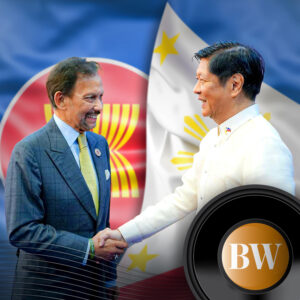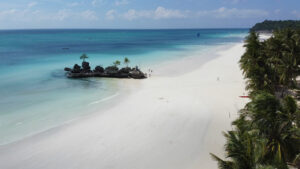[B-SIDE Podcast] Beyond handshakes: How ASEAN can help ease South China Sea tensions

Follow us on Spotify BusinessWorld B-Side
For the longest time, the Philippines has maintained a modest relationship with its Southeast Asian neighbors. Recurring tensions in the South China Sea have left the ten-member Association of Southeast Asian Nations (ASEAN) seeking clarity on how to navigate potential conflicts with China, even with the involvement of the United States.
In this B-Side episode, Herman Joseph S. Kraft, a political science professor at the University of the Philippines, discusses with BusinessWorld reporter Beatriz Marie D. Cruz the ways in which ASEAN can leverage its already strong ties to protect peace within its waters.
“Relations within the region are increasingly dominated by the rivalry between China and the US, and even if we keep emphasizing the idea of ASEAN centrality, it’s becoming more and more difficult to assert that,” he said in an interview.
The goal is to ease constraints felt by ASEAN within the ongoing rivalry between China and the US, Mr. Kraft noted.
“Ideally, ASEAN is going to be able to work in a way where it doesn’t have to actually play or at least play a role within the competition between China and the United States,” he said.
However, this is easier said than done, with ASEAN countries having their own national interests to consider.
The Philippines, Brunei, Malaysia, and Vietnam, for instance, each have territorial interests in the South China Sea, with China claiming more than 80% of the waters.
“It’s much more difficult for ASEAN to actually come up with a common appreciation of its strategic environment. Some of the members of ASEAN are actually closer to China, for instance, and some are actually closer to the US,” Mr. Kraft said.
As a long-standing treaty ally, the Philippines has allowed the US more access to military bases under the 2014 Enhanced Defense Cooperation Agreement. However, this has caused China to accuse the US of aggravating tensions in the Asia-Pacific due to its continued military expansion.
“There’s a tendency to see that or at least to look at the Philippines as going too close to the United States at the expense of our relationship with China, so our situation is seemingly a zero-sum game,” Mr. Kraft said.
He said that the Philippines should strengthen its diplomatic prowess to be recognized for its role in maintaining peaceful navigation in the disputed waters, especially within ASEAN, where the former is not seen as an “agent” of the US.
Members of ASEAN have been vocal about the need to ensure peace and stability in the region. Even Philippine President Ferdinand R. Marcos, Jr. said, without naming China, that ASEAN “must never allow the international peaceful order to be subjected to the forces of might.”
“We cannot emphasize enough that actions, not words, should be the ultimate measure of our commitment to securing peace and stability in the South China Sea,” Mr. Marcos Jr. said during the 43rd ASEAN Summit in Jakarta, Indonesia earlier this month.
Also present during the summit, Chinese Premier Li Qiang warned of a “new Cold War,” and called on affected states to “appropriately handle differences and disputes.”
“China has not necessarily been forthright about how it wants to deal with us,” Mr. Kraft said.
A security hotline between the Philippine and Chinese coast guards has been inactive since January of this year.
China and ASEAN also have yet to agree on a code of conduct in the South China Sea.
Mr. Marcos Jr. reported progress on the code of conduct at the ASEAN summit, with “milestone issues and a preliminary review of the Single Draft Negotiating Text…achieved in Manila.”
Foreign Affairs Spokesperson Teresita C. Daza recently said that the Philippines has submitted 43 diplomatic complaints against China this year. These protests are in response to China obstructing the Coast Guard’s resupply missions at the Second Thomas Shoal, also known as Ayungin, where the old World War II ship BRP Sierra Madre is stationed to assert the Philippines’ ownership in the area.
Given the region’s proximity to the South China Sea, ASEAN members should agree to a consensus on how the strategic environment should work, according to Mr. Kraft.
He cited how ASEAN made a strong stance against Vietnam’s invasion of Cambodia in the late 1970s and 1980s.
“It’s a very good example of how small countries, but acting collectively…[and] being able to sway public opinion on an issue that is central to their own regional concerns,” Mr. Kraft said.
He noted that stronger ASEAN ties would not likely be a threat to China and would similarly draw in conflict. “ASEAN has always been what some authors have said a political diplomatic community.” “Any increase in the [ASEAN’s] capability is going to be largely political-diplomatic, not hard security or military,” Mr. Kraft said.
When asked about China’s relationship with ASEAN, Mr. Kraft said: “Historically, it’s always been good.”
AFP MODERNIZATION
Alongside leveraging its diplomatic capabilities, Mr. Kraft also urged the Philippine government to be consistent with its modernization plan. He pointed out the country’s tendency to recognize the importance of enhancing its military capability when issues arise.
“Do we have to wait for a crisis to take the modernization of our instruments for asserting our sovereignty seriously?” Mr. Kraft said.
“All that China has to do is wait for us to lose interest.”
Follow us on Spotify BusinessWorld B-Side




